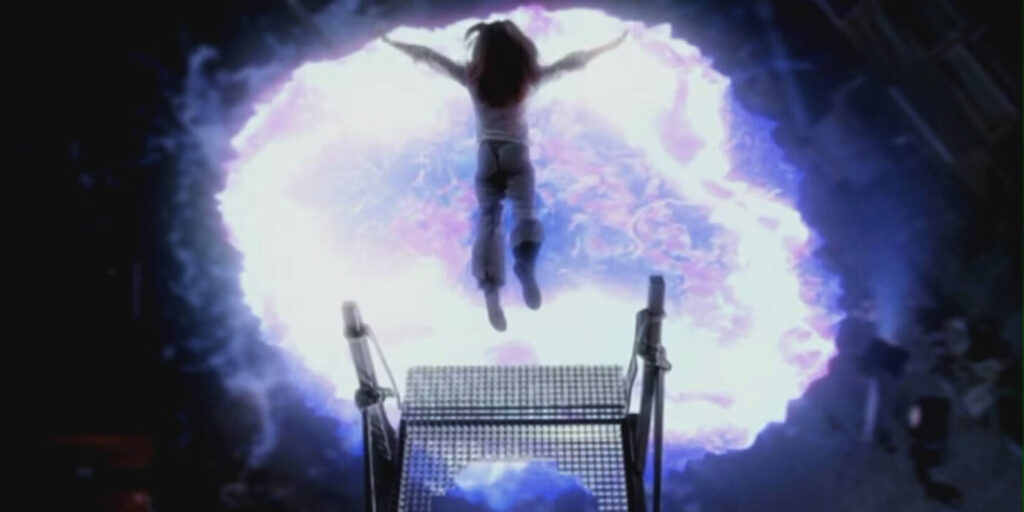
The Hardest Thing Is to Live: Why Buffy Season 5 Hits Harder in 2025
The fifth season of Buffy the Vampire Slayer has always felt like an emotional roller coaster. Revisiting it after Michelle Trachtenberg’s passing, I have found it hits on a whole new level. Knowing the actress who brought Dawn Summers to life is no longer with us adds a heartbreaking weight to every scene she is in. The gut punch lands deeper than ever when it builds to that final moment in The Gift.
The season has always stood out as one of Buffy’s most emotionally rich arcs. This is primarily because there’s a turning point where the monsters are no longer just metaphors. The overall story arc leans all the way into the realities of grief, loss, and some of the impossible choices that adulthood demands from us. Aside from her supernatural battle, the Slayer was confronting mortality, the permanence of death, and what it means to love someone enough to give up everything.
Nowhere is this more evident than in the episode of The Body. That silent and devastating episode had little to do with the supernatural and everything to do with real-life issues. There are no spells, no big Big Bad. Just the cruel, brutal truth of Buffy discovering her mother’s lifeless body on the couch. Even after all these years, the silence of that moment still echoes loudly.
There is no denying that Sarah Michelle Gellar’s skills as an actress have consistently shined throughout the series in some of the show’s most impactful moments. But her performance in this episode is absolutely gut-wrenching. However, I do have to give credit where it is due. The entire cast was superb with their individual portrayals of grief. How can we forget Emma Caulfield’s Anya and that iconic monologue? An ex vengeance demon dealing with the human emotion of grief for the first time. It gives me chills every time. The creative choice of background silence in this episode served another purpose. It would also shift the series’ tone forever while laying down the emotional groundwork for what would be coming.
Dawn’s initial introduction has a bizarre narrative twist. After all, she was the sister that Buffy never had and was retroactively written into everyone’s memories. As a result, it became one of the greatest retcons in a television show to ever exist. As the season progressed, the character of Dawn became an emotional anchor for Buffy that was not there before. She became a symbol of vulnerability, innocence, and hope.
Michelle Trachtenberg brought a fragile authenticity to the character that made her feel deeply real despite the character’s mystical origins. And by the time Buffy says, “She’s human. She’s my sister,” we believe it and feel it. That line is a turning point in the story and Buffy herself. It is in that final moment of The Gift when she chooses to sacrifice herself to save not just Dawn but the rest of the world, that Buffy fully embraces the meaning of love and selflessness. She didn’t win by slaying. She won by surrendering and choosing life for someone else.

“The Hardest Thing Is to Live”
The Gift is one of my favourite episodes. It’s a masterclass in character evolution and storytelling. Buff, who had spent five years wrestling with duty and death as the Slayer, finally embraced the idea of selfless love in the purest way. She saved the world not with violence but with compassion. The act defines her far more than any apocalypse she prevented before.
Buffy’s last words, “The hardest thing in this world is to live in it,” aren’t just directed at Dawn. They were directed at all of us. Those words are about finding the courage to continue even when everything hurts, to live in a world even when the people we love are gone. Rewatching Season Five in light of Michelle Trachtenberg’s passing brings these themes into painfully sharp focus.
While the introduction of Dawn was a surprising plot twist, the character became the cornerstone of Buffy’s heart. In light of Michelle’s passing, the season’s themes of legacy, loss, and love almost feel unbearably tender. It is no longer just about the storylines or the character arcs. It’s about remembering that the actors behind these characters left pieces of themselves in the roles, and those pieces stay with us. The grief that once lived in fiction now reflects something all too real.
While I’ve seen this season more times than I can count. This time in 2025, it hit differently. It feels heavier. It’s a reminder that the shows we love aren’t just mere entertainment for us. In many ways they serves as time capsules. To not just remind us of how deeply the characters touched and resonated with us, but also how the real people behind these very fictional characters leave echoes in our hearts longer after the screen has faded to black.




